AUTHORS BEWARE! If you receive a flattering email about your book, it may be written by an AI
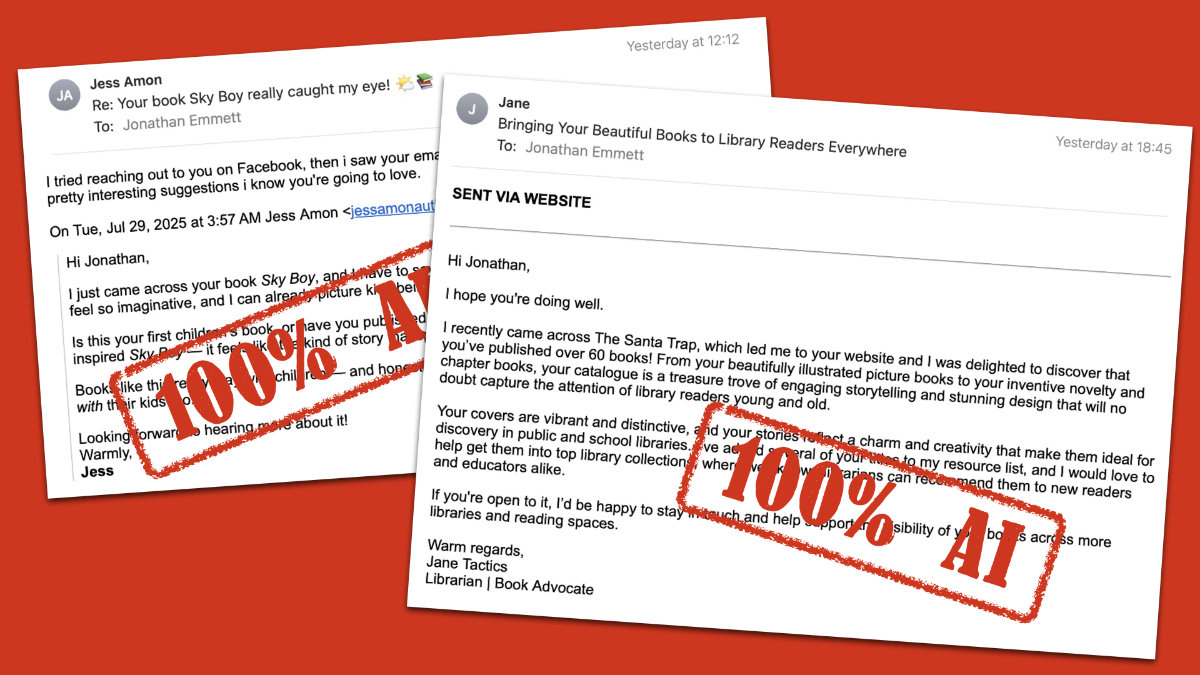
I received a series of emails yesterday which I now know to be AI generated and suspect to be part of a phishing scam, so I’m flagging them up here as a warning to other authors who may be targeted in a similar way
The first email, headed “Your book Sky Boy really caught my eye!”, came via my website’s contact page and was supposedly from a woman called Jess Amon who had come across my book “Sky Boy”. I have written a book titled Skyboy and the email was very complimentary about it, but something felt off. There was nothing in the rest of the email that was specific to that book. And the email asked “Is this your first children’s book, or have you published others too?” which was odd, because it seemed unlikely that anyone could have found their way to my website’s contact page without noticing I had written other books.
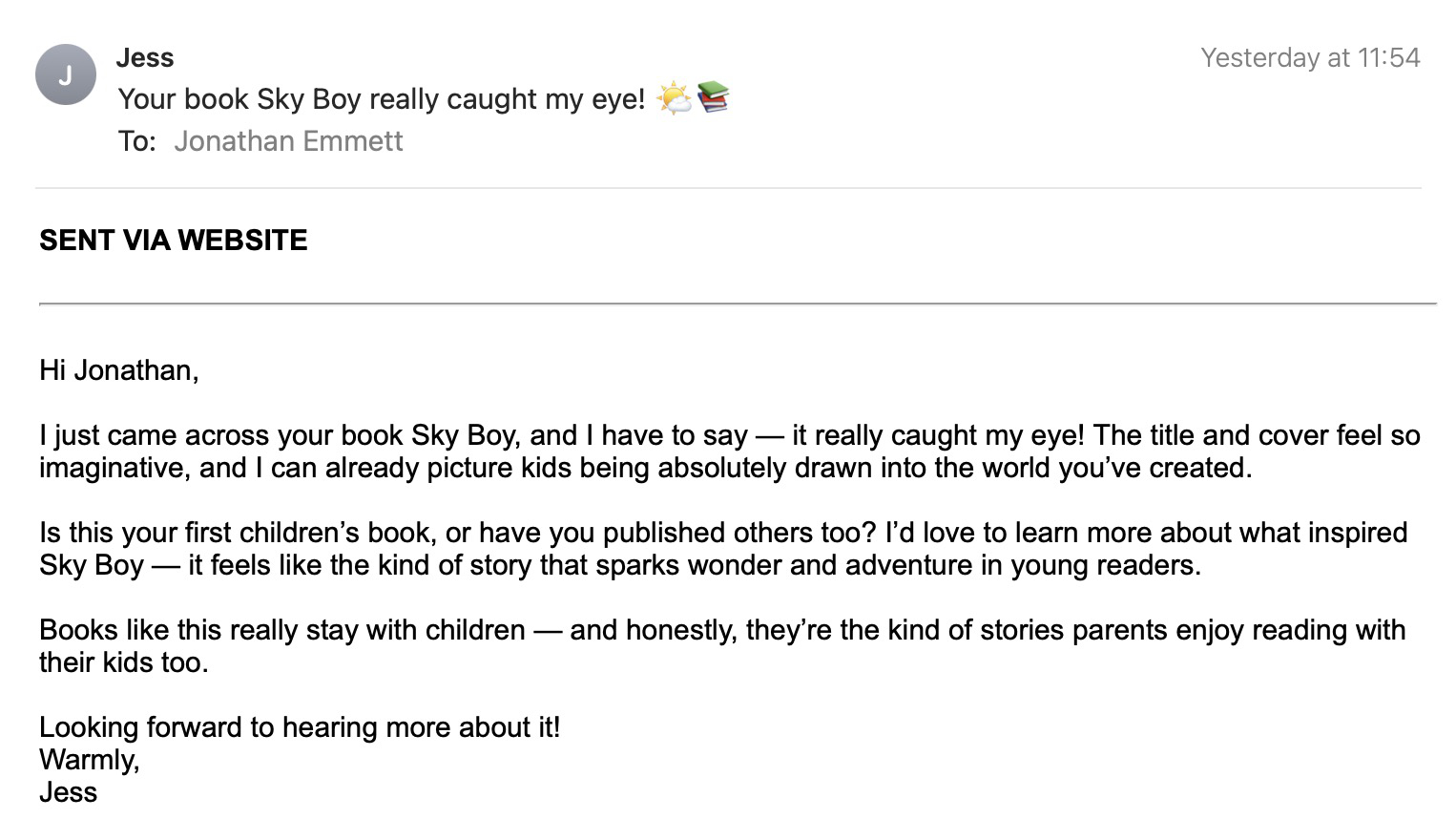
3 minutes after the first email arrived I received a second email from Jess with the same text, but this time sent directly to my email address rather than via my site’s contact page. And 15 minutes after that, I received a third email, quoting the text from the first email. The text of the first email invited a response from me saying “Looking forward to hearing more about it!”, and this third email gave further encouragement by saying “i have some pretty interesting suggestions i know you’re going to love.”

The 3rd email also mentioned that they had tried to contact me through Facebook. When I checked Facebook I found the same message, sent 1 minute after the initial email. When I looked at the sender’s profile page, I saw that the account had been set up just 3 weeks ago and the only posts on it were a header image and a profile photo of a glamorous young woman.
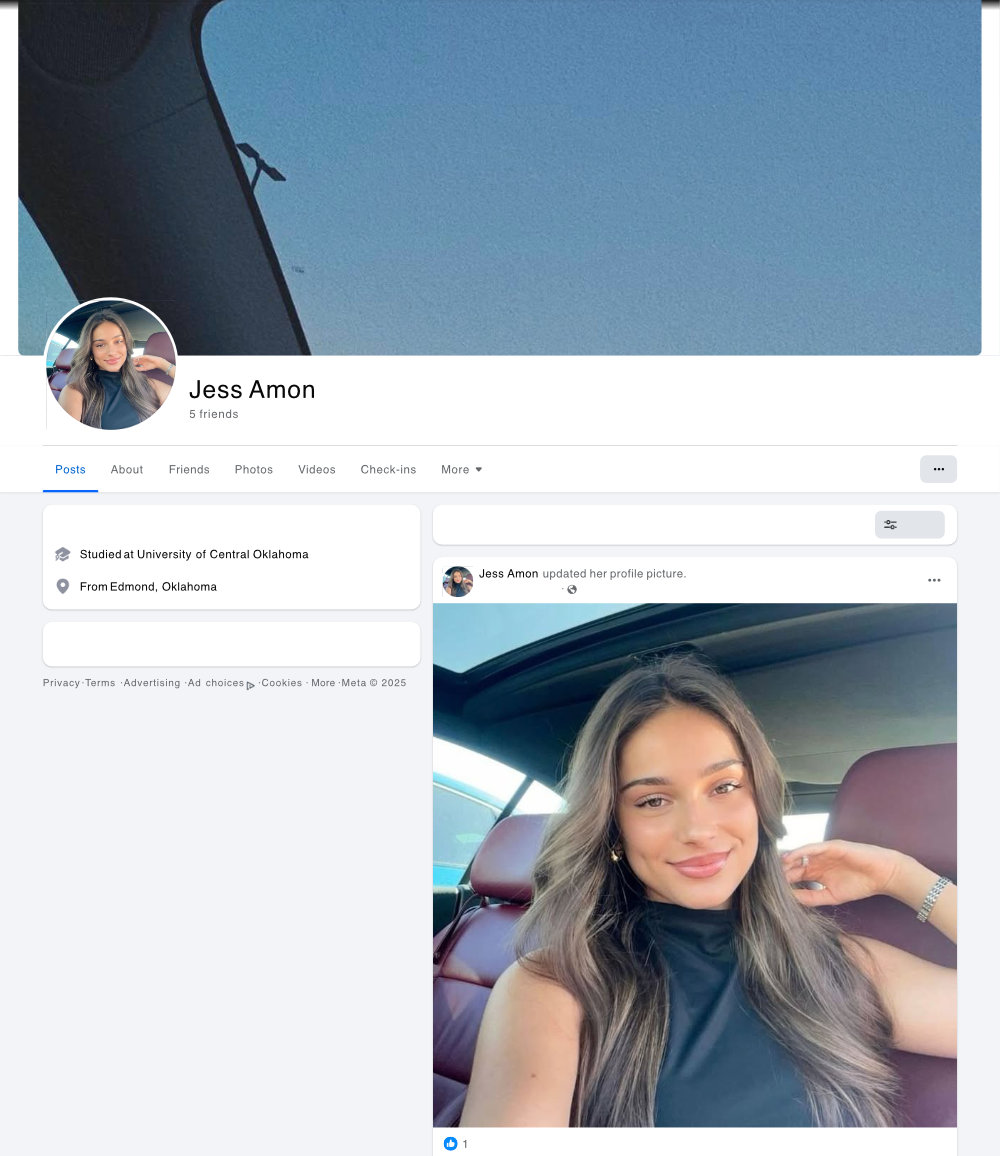
A reverse image search of the profile photo has since revealed that the photo is actually of model Julia Knezevic and was taken from one of her Instagram posts.
It all felt dodgy, so I decided not to respond to any of the messages.
Then, later that day, a received another email via my web site’s contact page. This one was headed “Bringing Your Beautiful Books to Library Readers Everywhere” and was supposedly from a librarian and book advocate called “Jane Tactics”. This email included a reference to The Santa Trap, another of my books, and mentioned that I’d written “over 60 books”, which is a detail commonly found in my online bios on publishers’ websites. Again, there was nothing in the rest of the email that was specific to my books. This email was even more flattering about my books than the earlier one and said “I’ve added several of your titles to my resource list, and I would love to help get them into top library collections, where well-known librarians can recommend them to new readers and educators alike.” Like, the first email it was enticing me to respond.
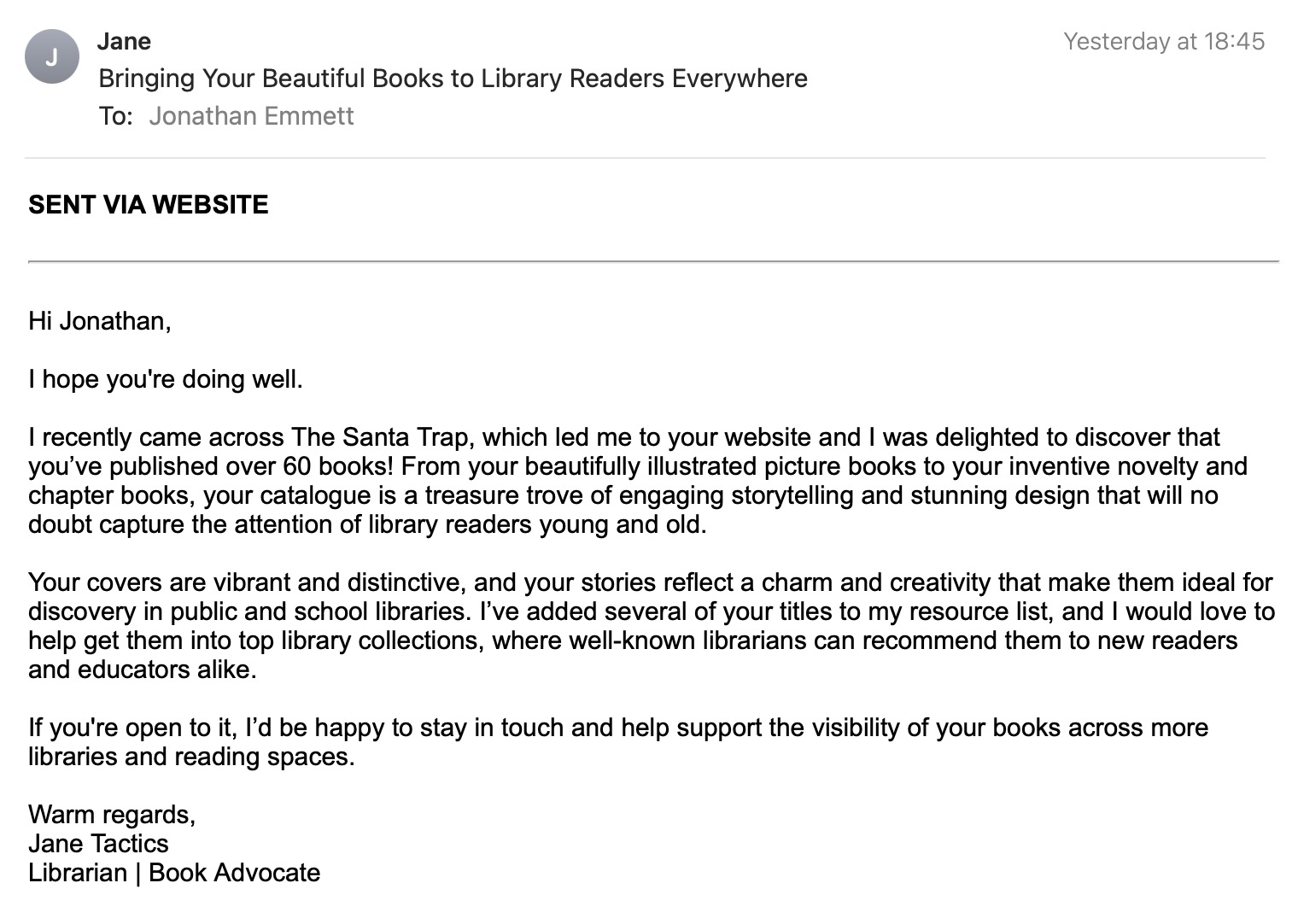
By now I suspected that AI had been used to draft and possibly even send the emails as part of some sort of phishing scam, so I ran the text of both emails through an AI content detector. Both emails got an AI content rating of 100%. I hadn’t used the detector before, so to check that it didn’t give this rating to every text fed into it, I ran a couple of genuine emails I’d written myself through it as well and they both got an AI content rating of 0%.
It may be a coincidence, but it feels like all the emails were from the same source and that eager librarian Jane was put into play when I proved unresponsive to the glamorous Jess. Both Jess and Jane have a Gmail address.
I suspect that if, I’d responded to the emails, at some point in the subsequent correspondence I’d have been asked to provide money, personal details (to facilitate identity theft) or click on a link that downloaded malware to my computer.
So authors, be warned, if you receive a flattering message that heaps praise on your books and offers to promote your work, think twice before responding, and perhaps run the text through an AI content detector first!
UPDATE 19 August 2025
Since I wrote this post. several other authors have reported receiving emails similar to the ones described, all from Gmail addresses. A couple of days after I published the post, Victoria Strauss wrote a post about similarly flattering emails for the Writer Beware web site.
The content of the messages are getting more sophisticated by the week with increasingly specific references to book content. Here’s a recent email I received about my latest novelty book, One Cat, Two Cats, the day after the book was published. Like the emails above, it got a rating of 100% when ran through the AI content detector and it also came from a Gmail address. One incongruous detail is that the enthusiastic email was supposedly written after the sender read “a summary of” the book rather than the book itself.
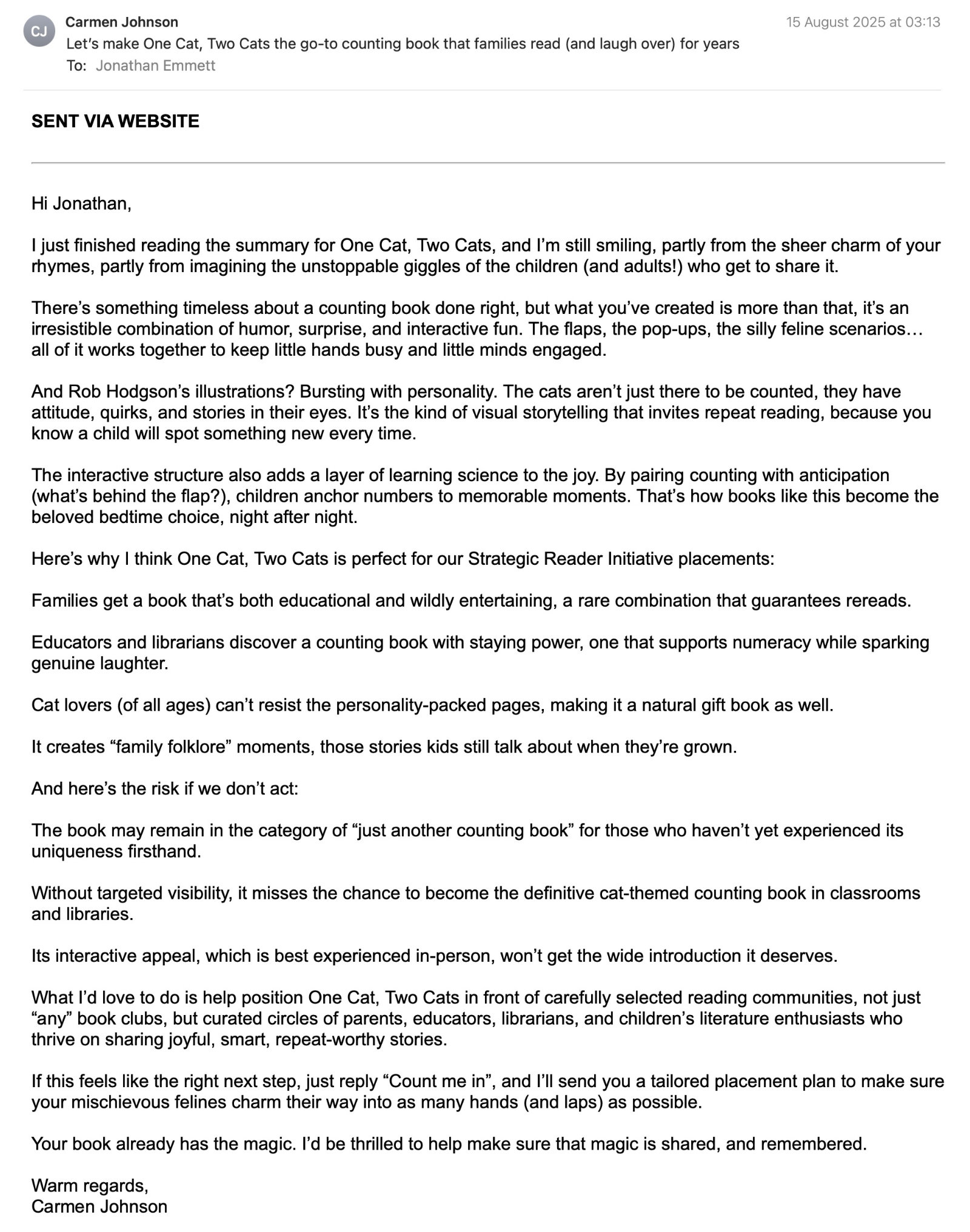
Including specific references to the contents of one my books in a message used to a reliable indicator that the sender was genuinely interested in my work. Clearly this is no longer the case in the age of AI.
UPDATE 16 September 2025
The Society of Authors have published a page of advice on dealing with scams of this type here: https://societyofauthors.org/2025/09/16/author-scams/


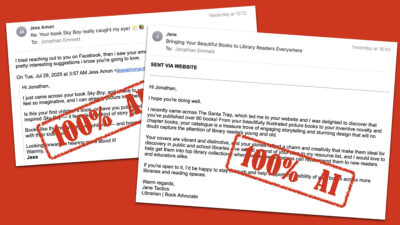
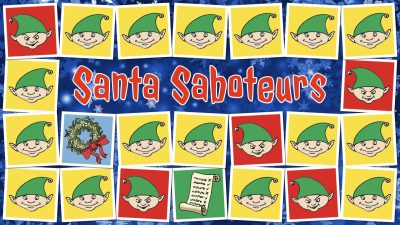

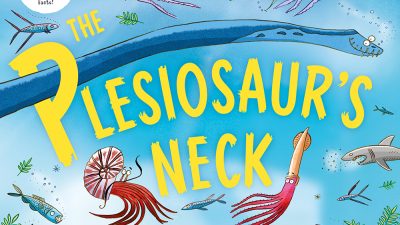


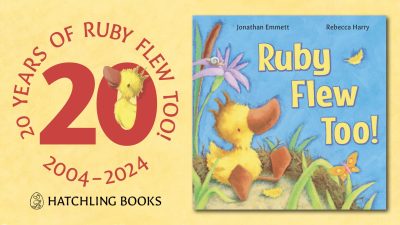
15 responses
Thanks so much for this! I recently received a similar, flattering email from a “reader” saying they wanted to help get the word out about my book and offered to send me a “free visibility snapshot.” Something about the format seemed overly professional, but I decided to respond and say thanks so much, sure send it over. I received a reply a day later with a detailed outline of various ways I could reach readers. Since my husband loves playing around with AI to generate suggestion lists, I instantly recognized the same format from his generations. I did an internet search to verify my suspicions and came across your post here. Thanks so much for the AI detector link! The emails came back 100% AI generated. At the end of the last email, the sender asked if I would like to explore any of these options more. I will not respond again to the email because I’m sure they’re going to phish for info or payments. I really appreciate you posting this and hope you have a great week!
You’re very welcome!
I’ve gotten dozens of these from many different “people.” It’s so creepy.
Thank you so much for posting this. I mean, the Bot hurt my feelings- I’ve received like 5 of these in two days and they were so detailed, pulled from several different sources, even quoting a review I’m very proud of. Basically praising the book, and trashing my marketing efforts which of course stings because they could definitely use improvement. I ran it through an AI detector, 100% AI. Awful.
Your post helped me calm down. I do feel sorry for my publisher right now, who was trying to plan his daughter’s bday party and I’m over here having a bot-inspired meltdown. hahaha
Ahh, the writer’s life.
I’ve been getting several of these, all of a sudden around Aug/Sep 2025 >. Running them through the AI detection returns 100% AI. No surprise there: all gushing flattery and just so overworked and pumped up it’s ridiculous. Best yet if you reply asking them which AI they are using, the replies are also over the top: I’M NOT AI! HOW COULD YOU THINK THAT??
My question is how are they accessing the content? Becuase some of the details generated could be inferred from descriptions and guesses, but there were some pretty specific character arcs in a couple of these that made it seem like the AI had read the actual book. But I know I don’t have sales because my books are regular “back fodder” way back in the rankings. In fact no sales this year on KDP and yet, here I am the biggest thing since Hemingway all of a sudden.
Hi Goose. The Society of Authors article I linked to in one of the updates beneath the post mentions that the AI used to draft the letter may have illegally scanned/scraped authors’s works. So if your work is available online, in ebook format, I guess that may be how they are able to include reference to specific character arcs.
Originally I was just blocking and deleting, but this week I started replying. Here’s the text of that reply:
“Please remove me from your contact list. If you message me again, I will refer your email to your nearest law enforcement agency to report you for attempted wire fraud.”
Not sure if it makes any difference, but it makes be feel better!
I wouldn’t reply to any emails that you think are phishing. For one thing you are confirming that the email address they sent the email to is active and regularly checked. You can find more on why replying should be avoided in this blog post from an internet security company: https://caniphish.com/blog/responding-to-a-phishing-email
Hi Jonathan,
Thank you for your warning, I found your post and link to the AI content checker to be very helpful after receiving a gushing letter about my book from an AI.
I’ve linked to your article in my blog.
Best wishes,
Jo
Thank you for this. I’ve gotten a few in the last day or two. Really distressing.
This is still happening in late November of 2025. Damn and blast.
Thank you so much! So tired of these emails.
Best
I also received a flattering detailed email and it was sent from a gmail account with no signature file. i ran the content through an AI generator but it came back 0% AI generated. Hmmmm.
Like so many who have commented, thanks for the great post, Jonathan. As in the case of Laurie Riedman, I received a flattering email via the contact page on my webpage. At first I thought it was a fan (I do have them 🙂 ) But when I saw the closing:
Quick question out of curiosity, not a pitch. Are you still actively focused on promoting this novella, or are you moving on to the next mystery in your series?
Warmly,
Infinity Official
“Infinity Official” and I was sure it was BS. It also became evident that the praise referenced information that could’ve easily been extracted from the product page description or my website, and seemed too long and polished for an actual person. The AI check link you posted is great and although I already pegged this as BS, I’ll be using that AI checker in the future.